In this conversation with Cassie M. Seinuk, one of our WSS alums who also went on to teach at the Lesley MFA in Creative Writing program, we learned several of her tricks of the trade, including using other mediums and genres to unblock herself, the challenges of writing something that’s not meant to be read, and how she started stage managing at the age of eleven.
Cassie M. Seinuk – WRITING FOR STAGE AND SCREEN, JUNE 2013
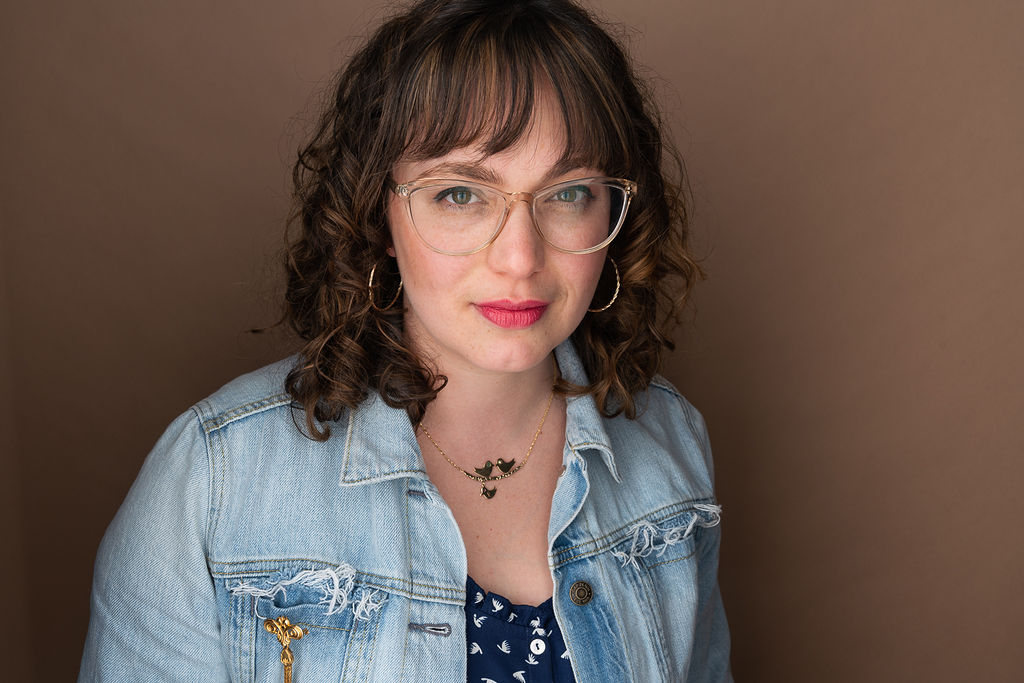
CASSIE M. SEINUK is a Jewish Cuban playwright, stage manager, and educator in Boston, MA. Her play From the Deep won the Kennedy Center ACTF Latinidad Playwrights Award, The Pestalozzi New Play Prize, the Boston University Jewish Culture Endowment grant, Honorable Mention on the 2015 Kilroys List, and IRNE Award and FringeNYC award nominations. Seinuk’s short works have been produced internationally, including her award winning 10 minute play Occupy Hallmark, which won the Gary Garrison National 10 Minute Play award at the Kennedy Center. Seinuk is on faculty at Boston Conservatory at Berklee and Lesley University MFA in Creative Writing.
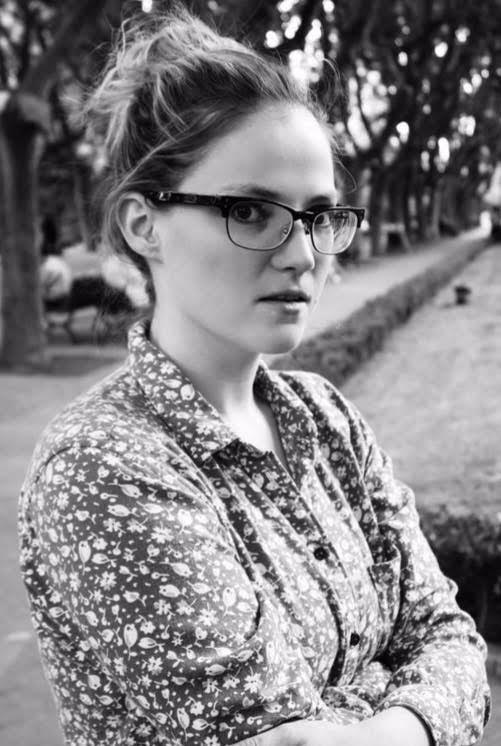
Interviewed By
Erin FM
Hi, Cassie. It’s awesome to see you! Talk to me about the project that you’re working on right now–either a writing project, or I know you said you were directing a show.
I’m working for a theatre company camp this summer [at the time of this interview, which was conducted in July] called Spotlight Workshop, which is like a 7 to 16 year-old theater acting workshop summer program, where we put on a musical in three weeks. And so we are doing Mean Girls. I do a lot of directing for children’s theatre and middle school aged theatre. And then my own project–I just started working on a pilot with my co-writer Jordan, but I’m not gonna talk about that. We’re in the baby stage. It’s the time to keep it close to the chest. And I am working on a book. And that’s something I will share. I’m working on a craft book on writing the ten-minute play from the perspective of someone who has stage managed/produced over 500 ten-minute plays.
Yeah, I was at two blocks of the Boston Theater Marathon (which you stage managed), and it was amazing because normally with ten-minute plays, they don’t give you anything, and the fact that some of them had full sets and like eight characters was kind of nuts. It’s amazing what you can pull off there and keep it to time. It’s insane. How is directing this summer show going?
They’re very talented kids. I think a goal is for it to become a regular summer gig and then to start doing Spring and Fall workshops as well, that aren’t productions but more like theater classes for kids that are a little bit more professional slash realistic. You know, I feel like there are a lot of theater summer camps or acting after-school programs that are a little bit like “drama club.” In the way that we negatively think of drama club.
Not so much training.
Either that it’s not training or it’s just creating this vision of, “The leads are the most important people ever.” This is something that, when I see the undergrads at Boston Conservatory, and they come in, I try to just drill into them that I don’t believe in the “triple threat.” We work in the arts, right?
So why is it a threat? Why is it threatening?
Like, are we in the military? The idea that–oh, she can dance, she can sing, and she can act—well she’s a threat. How about we’re all getting paid to play pretend?
A cast photo from the final moments of Mean Girls Jr. at Spotlight Theater Workshop where Cassie designed the set and projections as well as directed.
That’s a good way to look at it. Let’s talk about your work. What are some defining qualities of your writing–like issues you like to explore in your style?
I recently rewrote my artistic statement. Because I was teaching a class on writing your artistic statement with my undergrads, and I went to look up mine and I was embarrassed. I like to write “intimate plays that are magical.” I love small cast plays. I love two-handers, as you know. Under six is great. Where they might feel just from the initial read like, “Oh, this is very producible.” But actually, as you read, you find that there’s a lot of magic in the script and a lot of magical realism or opportunities for directors and designers to make big magical theatrical choices.
Do you think that you write for the people who are gonna have to work with what you make? You write things that human beings have to physically interact with.
Well, that’s the question that I ask, and it’s a question I asked of my students also: is this a play? Is this a screenplay? Or is this a novel that you’re trying to write as a play? Plays are not meant to be read. Plays are meant to be played with–that’s why it’s called a play. So when I give a student a play to read and they’re like, “Oh, it was really hard. And I had such a hard time focusing and understanding it,” and I say, “Did you read it aloud?” And they say, “No.” I say, “Okay, let’s read it aloud.” And we read like two pages aloud, like especially something like Caryl Churchill. You read A Number by Caryl Churchill aloud and you’re like, “Oh, that’s what this play is!” Right? Because they’re not meant to be read. And then at the same time, so much of the footwork that’s done for a playwright or a screenwriter is getting your script past a reader. So like, you’re in this weird place where you have to write for the reader. But you also have to write something that’s not meant to be read.
I have heard that about things (of mine) that I’ve somehow managed to have people do. I was directing for a new play incubator, and a writer dropped out in the last cycle, and so they were like, “Erin, you’ve been running around being a director and an actor when needed. Can we have one of your plays to do?” And the person who told me they would have no idea when they read it how to stage it was like, “Oh, I get it.”
Read it, right? I mean, (your play) Temporarium falls into that kind of playground. Like, if you read it just on the page, it’s not the same as if you see it or hear it. It’s totally different.
Yeah, it has to be read out loud. I don’t read plays, I do readings of plays in the house–even if I’m just reading a play for Play Club or just for fun. I will snag people from my house.
Right. I mean, I tell my undergrads because sometimes I teach a theater literature course. And I have first year students who are not used to reading plays. They love theater because they’ve watched every Broadway show possible and listened to all the soundtracks, but they’ve never really read plays. And so they have to read like 12 plays similar to what we do in grad school–12 plays a semester. And I could tell when they’re not reading it, and my advice is always like–all of you need to read this play. So why don’t all of you get together and read it aloud? Because that’s going to take you two hours. Whereas if you sit down and try to read it and you’re too distracted to read it or you can’t focus on it, then it’s gonna take you way more than two hours to read, and it’s gonna feel hard.
Cassie (R) stage managing at the Boston Theater Marathon
Have you ever abandoned a project after getting a good ways through, and how did you make the decision to abandon it if you did?
I don’t know if abandoned is the right word. But I started as a fiction writer. I did my undergraduate–I had a double major–a creative writing major in which I was a fiction student. And then I had a theater major in which I was a stage management student. And at Brandeis at that time, if you were a “mid-year,” which was a new program at that time, it meant you didn’t start your freshman year until January. They hadn’t figured out within all of the different majors how that would affect majors where you need to declare a thesis by the end of your sophomore year. But if the end of your sophomore year was actually December rather than June they just could not compute. So I was basically told, “You can’t do a thesis, because we don’t know how to deal with that.” So I cried to my stage management advisor, who was like, “Why don’t you write a play?” And I was like, “I don’t know how to write a play.” She’s like, “What do you mean? You’ve been stage managing since you were 11 years old. You love theater. And you love writing. So why don’t you take the novel that you were writing and turn it into a play?” So I did.
And that play had a thesis production of it, which was pretty cool. I mean, it’s huge and really ambitious, and has 13 characters and it’s a lot–it’s like an epic theater piece. Like very in the Bertolt Brecht kind of vocabulary and it had a workshop in Chicago, like a bunch of things, and then–dead. And so when I was here as a grad student, for my IS, I worked on it as a novel again. And opening that up again a few years after graduating college was like, “Oh, this is written by a college student. I started writing it when I was in high school. So this is written by a 16-20 year old. And looking at it when I started grad school, I was like, “This needs a lot of work.” And I spent the semester, I wrote six or eight more chapters of this novel. It’s not done yet. I know how it ends. I just haven’t typed it, and I don’t know that I will. But every once in a while, if I’m stuck in something that I’m actually focused on, I’ll hop onto that document and just play a little bit. Because it’s like it’s an old friend.
Yeah. I was talking to my friend Lucie about this last night. She’s an improviser as well. And she’s a therapist. And I was telling her that sometimes when I can’t write a play, I write flash fiction.
Yes. Oh, I love that.
You can do everything that you aren’t allowed to do with a play. You can make it not at all about dialogue. You can change the time, you can put in any images you want. You don’t have to think about format. You don’t have to think about anything that you need to focus on that you’re obsessing about. And I’ve found that if you’re writing in something that you don’t consider your genre, you feel more freedom to play.
Yeah, because you don’t feel like, “I have a degree in this, so I should be doing this correctly.” I’ve definitely pivoted, and this goes back to the same thing I said before, it’s like, what is this? Is this a play? Is this a film? Is this a pilot? I’m working on this pilot right now with my with my collaborator, and for about six months, we were working on this as a new play. We wrote a play: we spent a year on Zoom doing this really cool process where we wrote a play together. Sitting on Zoom, he wrote two characters and I wrote two characters. We would get on Zoom and go open a Google Doc and legitimately have dialogue back and forth in this Google Doc as these characters. And we wrote a play like that.
That’s really cool.
It’s called Pause, Play, Stop. It’s a really cool play. But then, we were like, “Let’s do it again!” And we started to do it again. And we had about six months of meeting and talking and trying to get stuff on the page and we’d still be like, “No, we’re not ready yet.” He texted me about two weeks ago and was like, “We’re not writing a play. We’re writing a TV series that we’ve been thinking was a play.” And now we’re realizing we can’t tell the story in one evening. And what we want to do with this story is going to be so much easier for us to do in film. It’s kind of sci-fi. So it’s like, I guess we’re writing a pilot now, and he’s like, “I guess we are.” And so that’s the thing: you might sit down to write a play and be like, “No, this is actually a piece of flash fiction.”
Yeah. It’s all it needs to be. And again, if you’re writing outside of your genre, you’re like, “I don’t have my entire identity wrapped up in this. I’m not a poet. So it’s okay, if this is a poem.”
You put pressure on yourself, right? When I go through writer’s block, it’s because I’ve put a lot of pressure on, like, “Okay, well, that last thing I did was really successful, so now I gotta do it again.” And sometimes the reality is you cannot replicate the thing. I’m writing a new play right now. I think it’s gonna be a rom-com play. I have never written a rom-com play that isn’t 10 minutes long. I write horror, psychological thriller–intense brain stuff. My tagline at Boston Public Works, was Cassie: Serial Character Killer. Because that’s what I do. And I love to do it. It’s great. It’s so much fun. I love these people, but I have to kill them because that’s where their fate has taken them. So to sit down and be like, “I think I’m gonna write a rom-com,” that’s fun. That actually unlocked something because I’ve been trying to write this serious play about women’s bodies and body issues and body dysmorphia and running. And actually, it’s a rom-com about all those things. It’s fun.
A young Cassie just a short time before beginning her stage managing career.
I usually like to ask people about early memories, and you mentioned you started stage managing when you were 11?
Yeah. I started stage managing when I was 11. I went to sleepaway camp when I was eight because my dad was head of the lake for a few weeks of the camp, and so it was a good gateway in, so he sent us up there 1996 or ‘97. So I was like eight. And I was in a play for the lower campus, the younger age group, and that was Peter Pan. And I played Michael–always forever playing the baby. I had such a good time. And I got the bug. I already think I had the bug, but I got the bug. And then I was like, “I want to do more.”
But I was too young to be in the middle campus play, and I wasn’t talented enough to play young Cosette in the upper campus play which also included counselors and CITs. So then the next year, I came back to camp, and I was in the middle campus play. And I played Gretel in Sound of Music, but that wasn’t enough. So I said to the director: “Hey, is there any way I can work on the upper campus play Les Mis, or can I work on the lower campus play? And she was like, “Do you know what stage managing is?” And I was like, “Nope.” And she was like, “Great. Okay, well, you can be my stage manager and I’ll give you special permission to come, and you can take notes for me and write down what we have people doing on stage and what we need to have the crew doing.” And then two years later, I was stage managing two out of three of the shows at that camp. And I guess the second or third time that I was doing that, she was like “Okay, and now you’re gonna operate the lightboard. It was like an eight-piece lightboard–it wasn’t some big theatrical lighting board, but I learned how to use cross faders and to build light cues. And then from there, I learned how to adjust sound and mic levels, and it just kept building.
So by the time I was 16, I had already stage managed like ten shows. I knew how to take blocking notes, and I knew how to write cues and I knew how to build cues. And I knew how to do set changes and all this sort of stuff. I just had this skill set. And my high school had this really cool program where they brought a New York producer to come and produce the fall or spring show, and it was a straight play because I went to a Jewish school and girls couldn’t sing in front of boys. I auditioned because I still thought I could act. And I look back on that audition and I’m like that was the most humiliating thing I ever did and I had no awareness of it. But I said I’d like to stage manage. I said, “I’m auditioning, but really I’m here to let you know that I’d like to stage manage.” So then I got to run the deck for that show and the next show and the next show. My senior year they cut the program–because sports–and so when I went to college, I was looking for stage management programs. Which I feel like is rare. For a high school kid to come out knowing “I want to go into technical theater.”
Mostly it’s a lot of master’s programs.
Or it’s people who think, “I want to go into theater because I want to act and sing and dance,” and then it’s through that process that they realize what they actually want to do is direct or be on a crew. So that’s my crazy story.
And it made me feel important. I didn’t want to be “ensemble member seven” in Joseph who got to have a paragraph of singing in one song. I’d much rather have this big job where I got to be really important. And I also didn’t have to get up on stage and sing in front of people, which I started to learn was not my favorite thing. I did get one musical where I was the lead. I was Lola in Damn Yankees when I was 16 at that same summer camp, and I got to sing “Whatever Lola Wants, Lola Gets,” which is a very sexy song, and should not be sung by a 16-year-old girl. And I remember I had so much fun. And I felt so good. And then this hotshot guy who was in this big Ben Stiller movie when we were kids was at my camp and he came over to me the day after the play. He sat down at my lunch table, and was like “Heeey, you were really good in the play.” And I was just like–nope, never again. And that was that.
Since you’ve been working in theater since you were a little child, I’m sure you’ve had time for plenty of revelations. But is there anything that you have learned about being a professional theatre maker in your post-MFA life that you wish you’d known?
Oh, yes. This is a very new mantra that I have. Well, first, an old mantra. Jami Brandli said this at the graduation speech the semester before I graduated. She was telling a story about someone and she said, “I get to write.” And she reiterated that many times in the speech: you get to write. It is a choice you’ve made, and it’s a gift that you have. You get to do it. You don’t have to do it. You can do anything else in the world. But you get to write, so sit down and write. I don’t have any tattoos, but if I were to tattoo something on myself, that’s what I would tattoo. And, like, “Jami Brandli owns your soul.”
The second thing is the thing that’s really recent for me, and it’s really been the healthiest practice I have started to do as a professional writer. And as someone working in this field, which feels very competitive, and in this post-COVID world (feels) unstable: “Not my time.” And I say it; I throw my hands up in the air. I say it all the time now. Like when I get a rejection letter from something that I was this close to, or when I find out, “You’re a semifinalist at this thing, and the only reason why we couldn’t advance you was because of a technicality or because you couldn’t come to the festival.” Rather than really beating myself up about it, I’ve been saying, “It’s just not my time.”
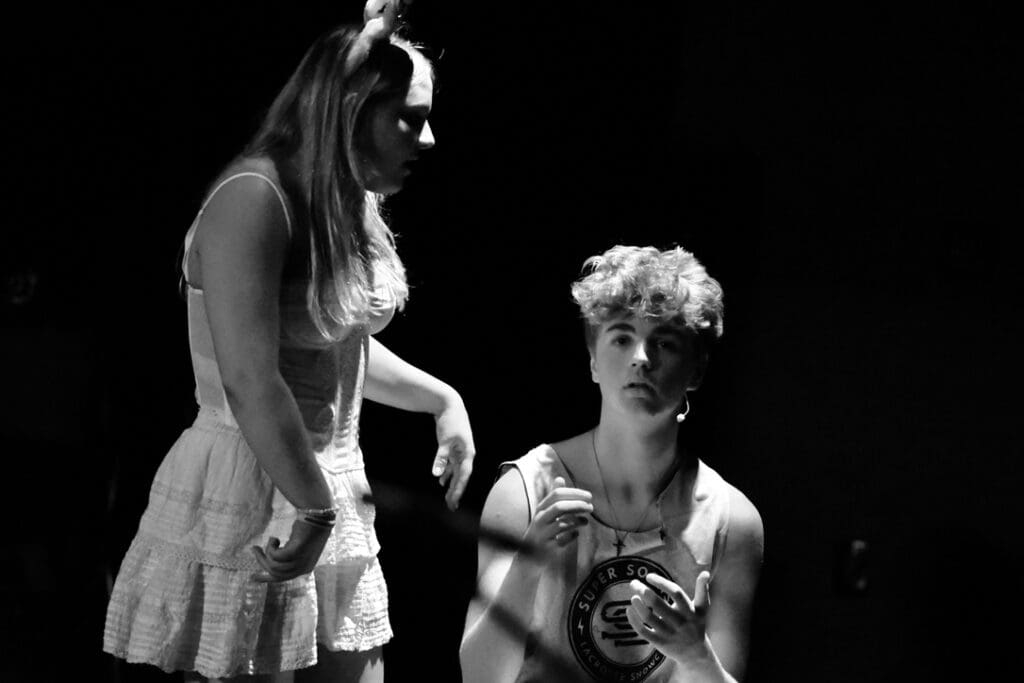
From Mean Girls Jr. — Amelia Brodrick (L as Regina George) and Miles Salerno (R as Aaron Samuels) singing “Someone Get’s Hurt.”
And that has taken a really long time because I think that there was definitely a phase especially right after I graduated, where I had a lot of stuff going on, where I was like, “It is my time. How come that person got it and I didn’t get it? We’re essentially the same. On paper, I’m such a better candidate, because I check off so many more boxes than this person does. I should have gotten that thing!” And it would eat me up. I started thinking about the competitions and the awards and advancing and moving forward, and that was really negative on my writing. And going back to what Jami said: you get to write. It’s about the work. The end of the day, it’s about the writing because we chose to do this. And the writing is both your product and your tool. So knowing something’s not my time, and allowing that to be okay, has been a relief.
And I’ve also very recently seen stuff like that play out: I had a play that I wrote like seven years ago in a fellowship program, and then I got to do another year of that fellowship program, and then I won a Mass Cultural award for it, and all this stuff–and then nothing. And I was like, “I guess all that work was for nothing.” That’s the feeling; you start to label it; like, “I worked on this play for so long, and that’s it?” And then I resubmitted it to something this year, seven years later, and it advanced really far in that competition. And I was like, “Well, well, well. Look at you, gem.” Saying then might not have been my time, and even right now, it didn’t go all the way, so still not my time, but the play is still a good play. And it’s okay that its life lives on the New Play Exchange.
I always talk about my “99 Nos” like I’m working on it. Because I feel like you can repackage rejection as a goal. I’m always like, “Oh man, I’m like halfway to my 99 Nos. I’m so excited.”
When I was in high school, I had a friend who was top of the class and did one stupid thing his junior year that had to then go on all of his records. And he got rejected from every Ivy League that he applied to. Whereas before that, he was a shoo-in for Ivies and scholarships. And his response was to throw a rejection letter party. And the only way you could attend the party is if you had a rejection letter from a university or college you applied to. And so everyone came with their rejection letters, and then they got to go into the party. I’ve definitely stolen that idea and put it into work of mine. There was like a brief period of time where I had a blog that was called “Rejection Letter Party,” and I would black out names of theatres and just post all my rejections on Blogspot or whatever.
I love “Thank you for sharing your art with us.” Oh, my God.
I love “There were so many great applications and yours was one of them, but–”
Yeah, “But unfortunately…”
“Unfortunately there was an overwhelming number of submissions.”
It’s always a “record number.” It always happens to be the year that you apply that has the record number of submissions.
And that’s where my other piece of advice is: just keep sending your stuff out there and keep going to other–like as a theatremaker, keep going to other things. Go to theatre companies having a 10-minute play festival, a one act (festival), a 24-hour play thing–go to these things because if that company rejected you for your full-length that you submit for their season, but then they get to know you, then you’ve established a relationship. You meet other writers, you meet other people, and the connections might be slow, but they pay off.
And younger people too–people who are your level and below. I think that’s an often-neglected group of people, because people tend to focus on the decision makers, but when you focus on building relationships with people who are your level and under, those people could be your boss in a year.
Yeah, and those people are often looking for work. I remember after I graduated from undergrad, and I had this play that I just worked on as a thesis, and I was stage managing. And me and the director just poached a bunch of the young actors who are serving as acting apprentices to do a table read of my play. Because we were like, “Oh, well, here are all these fine young men and this play has a cast of 12 or 13 fine young men and one woman and let’s ask any of these people if they want to do a reading for us.” And one of those people ended up being a longtime collaborator of mine, and I write for him, and he thinks of me when he needs something. That’s from me just being like, “Here’s someone who wants work. I want people to read my work, and now we have an artistic relationship.”
Cassie (C) surrounded by her cast.
Do you have an agent?
I do not have an agent, but I do have people who are my kind of unofficial spokespeople. And that’s just artists that I’ve developed really strong relationships with. Occasionally I’ll get an email, and they’re like, “Hey, I was just asked by a theatre company if there’s a show I would want to direct next season. Can I send them your play?” Yes. Every time, yes. And sometimes it leads to nothing. And sometimes it leads to a conversation and then nothing, and then the rare times it leads to actually a thing.
I’ve seen your resume–I mean your resume is in 7pt font or something.
I have a new resume too because I had to just get rid of so much stuff.
You have a million productions. Your resume is insane.
But not having an agent…I also just don’t think I’m there yet. I don’t want an agent for theater yet because I don’t think that would help me right now. Right now it’s more about like the personal connections and trying to get more people excited and interested in my work. And then we’ll see from there.
Along the same lines, I know that you have self-produced before. So what is that like? And what advice would you have for students who might consider going that route?
Self-producing is amazing and really, really, really hard. The hardest part about it is the money part. I’ve done self-producing three times, and each time in a different format. I helped collectively raise over $40,000 with my group, Boston Public Works, when we existed, and we were a 13P or Welders style company where we did one play of each of our playwrights and then we intentionally imploded at the end. We donated whatever money we had left to a theatrical organization in our city, and each playwright worked as the artistic director for their own show. And then served as another administrative role on the next shows. That was really hard because you have to find people that you really trust and want to spend a lot of time and go through a lot of legal hurdles with, so it’s not for the faint of heart. But I did learn how to then crowdsource and fundraise myself. So then, kind of almost simultaneously with that, I self-produced a second production of one of my plays, which was almost a remount, but a slight reimagining, and I was able to put on a show for like $13K, almost entirely from other people. I did get one grant. And then I did it again and I took my show to NYC Fringe–a different show. And what I learned through all of that is that after doing three crowdsourcing campaigns, nobody wants to give you money anymore.
It’s like an MLM–once your market’s saturated…
Yeah. It’s like asking people to donate a kidney to me, right? They’ve donated their kidney to me–they’re not going to give me their other kidney. For a lot of people outside of our industry, they don’t understand that really, I’m asking for $5. Because if we learn anything from crowdsourcing or from 13P–which was before crowdsourcing on the internet; it was postcards, right?–if everyone you know, in your network, on your list gives $5, that’s a lot of money. I would frame it as, “Take me out for a cup of coffee, virtually. Buy me a drink at a bar. A drink in a bar is $8. Rather than just saying, “Give whatever your heart wants.” Because $25 might not be available for someone to give, or they feel like if they donate, they have to donate like $100. It’s like no–five, just five. Would I self-produce again? Absolutely. Do I have the brain space for it right now? No.
If you go through (something like) Eventbrite, you sell tickets, and you have to declare all of that as income. But I’m gonna give it all back to my actors and my performers and my playwrights. So how do you fundraise or sell tickets in a way that’s not going to mess up your taxes?
There are services like Fractured Atlas, which basically allows you to be a nonprofit through them. And then you have a plan of what you do with the money there. There’s also like, incorporating. One of the times that I self-produced, I did it under the umbrella of another existing theatre company that was kind of dying, and I was like, “Look, I’ll do it all, but I want to use your name, your LLC, all that stuff. And I feel like IndieGoGo and Kickstarter and those websites have a way to declare; there is a form. So there are some systems set in place. But it’s not income.
Yeah.
And don’t expect to make money.
Oh, yeah, no, that’s not…
Pay your actors, and if you don’t come out in the red, you’re lucky. And this is a big rookie mistake and greener self-producers think that they’re going to use ticket sales to pay their artists. Pay your artists first. If you want to then cover your sectors, like your set budget, your costume budget…if you want to pay yourself, then use any income you’ve made to do that. But make sure your artists are all paid. From your own bank account or whatever bank account you’ve established for the show. Because they are the people. And at the end of the day, it’s about the people, and you want the people to work with you again. You don’t want to screw over the people.
I think that’s the best advice: pay artists. But also, there is an element of theater where new theater can’t get made unless people are sometimes willing to volunteer their time and hearts and energy.
Absolutely. And I think about this a lot. A collaborator of mine, Theresa Lang, she always says, “What is your pay model? If everyone is getting paid, then everyone’s getting paid. If no one’s getting paid, then no one’s getting paid. You can’t pay one person and not another. And so sometimes, I’ll do a table read of my work just over zoom or I’ll invite people over, and one actor might say, “I just want to see if this is paid. Because I can’t really donate my time.” And sometimes I’m like, “It’s not paid, but I’m going to be cooking you a three-course meal.” And for some people, that counts and other people, they’re like, “I need at least five bucks.” And sometimes I’m like, “I can’t do five bucks for this. But you know, can I treat you to theater tickets some time?” Like, is there another way that we can barter here? Yeah. Or maybe this just isn’t the right project, and when I do have a job that I can pay you for, I’ll come back.
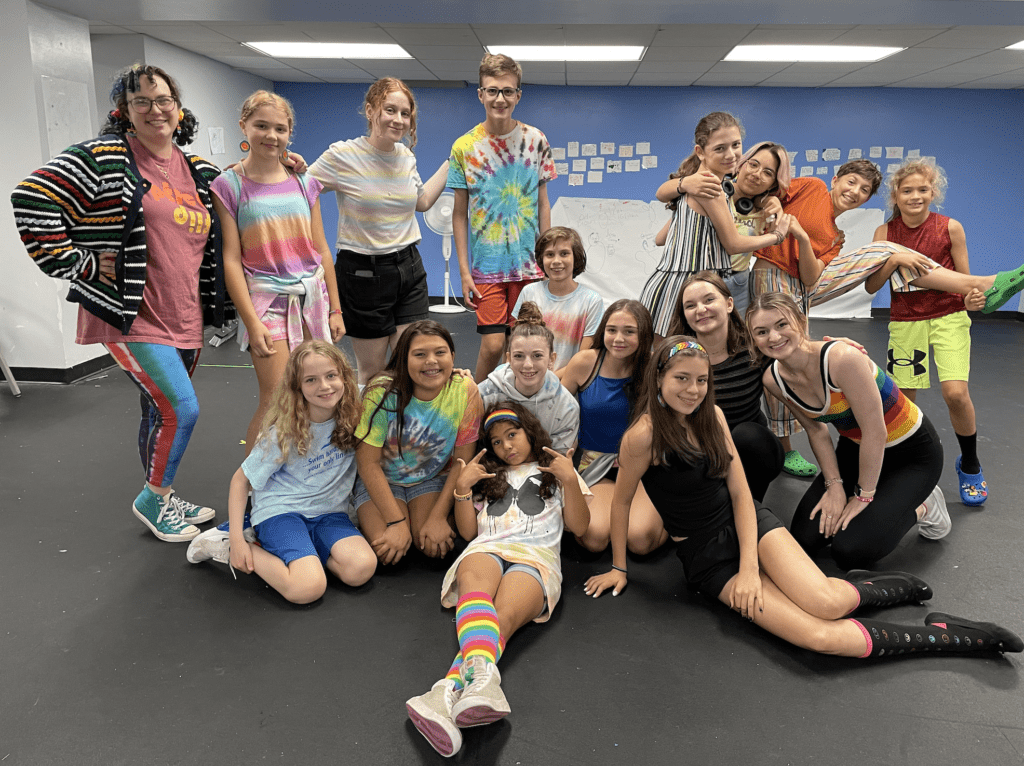
Cassie (L) celebrating “Rainbow Day” with the cast of Frozen Jr. during rehearsal.
Yeah, that’s the tricky thing, and I’ve spoken about this with my visual artist friends who are upset about AI. Because if I want to use AI to make a poster for a reading I’m doing or something like that, as a visual artist, you’re telling me I can’t make my art for free until I pay you for your art? You know, until I pay a visual artist to make a poster for my reading, I can’t do something I’m already not getting paid for. That doesn’t seem fair.
And that’s when I’m like, learn to do Canva yourself, right? I look back at some of my early poster designs–and I do do a lot of my own graphics–but like, I look back at my old poster designs, and it was really me finding obscure photos that I took of nothing. And just playing with some filters, doing some weird things, putting some fonts.
I do the same thing. Even when I do use AI, I will cut the thing out and then put it through a bunch of filters and reposition it, and at the end of the day, it’s a collage.
Yeah. And if you can find AI that can read your play aloud and act and have emotion that’s great. But AI isn’t people. And in the end, you’re writing something for people to see and experience. You’re not writing something for a computer or an artificial intelligence to use as data.
I’m willing to use AI for a poster, but not to help me write a play because I want it to be me, even if what I do is going to be worse than what the AI could put out. I still would never use it. For something I would put my name on.
Unless that’s intentional, right? Unless it’s like, “This one character in the play was completely written by AI.” Well, that’s interesting. What does that mean? You’re still curating it. We can’t be replaced because we are human beings, doing something that is meant to create catharsis in some way or another.
And we should expect to be paid whenever we can.
And that’s something I say to actors: sometimes what you get paid in isn’t money. Sometimes it’s experience. Sometimes it’s a relationship. We bring actors here for the Play Labs. And relatively, we’re paying them a pittance. It’s a good hourly rate; it’s above minimum wage. However, they’ve just met all of these artists in this room and worked with this director, and they have this connection now.
Yeah, any of those actors that were in my grad reading or my Play Lab–I would call any of those people again.
And you’ve established a relationship–for both them and you. They can be like, “Hey, I know a local playwright, screenwriter, comedian.” That’s cool. That’s why I also bring the same people back a lot: so that they develop relationships with our students. As like, “Oh, that’s an artist I know.” Because we work with them at residency and I bet I can email that person and they’ll do my zoom thing or they’ll come to my table read around the house with a box of pizza and a bottle of wine.
Yeah, that’s part of the professional skills-building stuff that I think a lot of people hope to get out of an MFA program. Why are we paying for this? Well, the networking is a massive part of why, if we’re honest with ourselves. It’s the deadlines that aren’t self-imposed and the networking.
Right. And that’s why you go to places like The O’Neill. That’s why you go to these things. I remember when I was a Kennedy Center Fellow–or Kennedy Center Fellow observer–one of the people that won that same award didn’t end up going because they would have to travel, and even though they were getting some of the travel paid for, they just didn’t see the value in it. And what they missed was that we got to spend a week at the O’Neill. With very little to do. So, we just got to be in rehearsals and go to readings and go to plays and sit and talk with artists and go to dream designs. Completely invaluable, right? So much of that experience for me is something I cannot put a price tag on.
Absolutely. I can leave it at that!

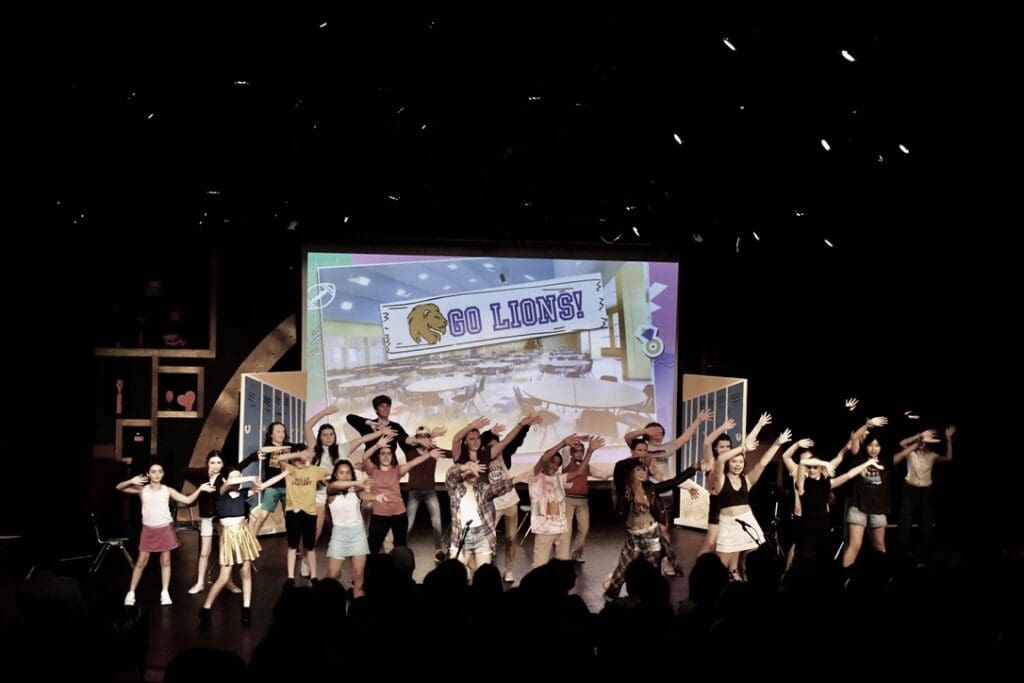
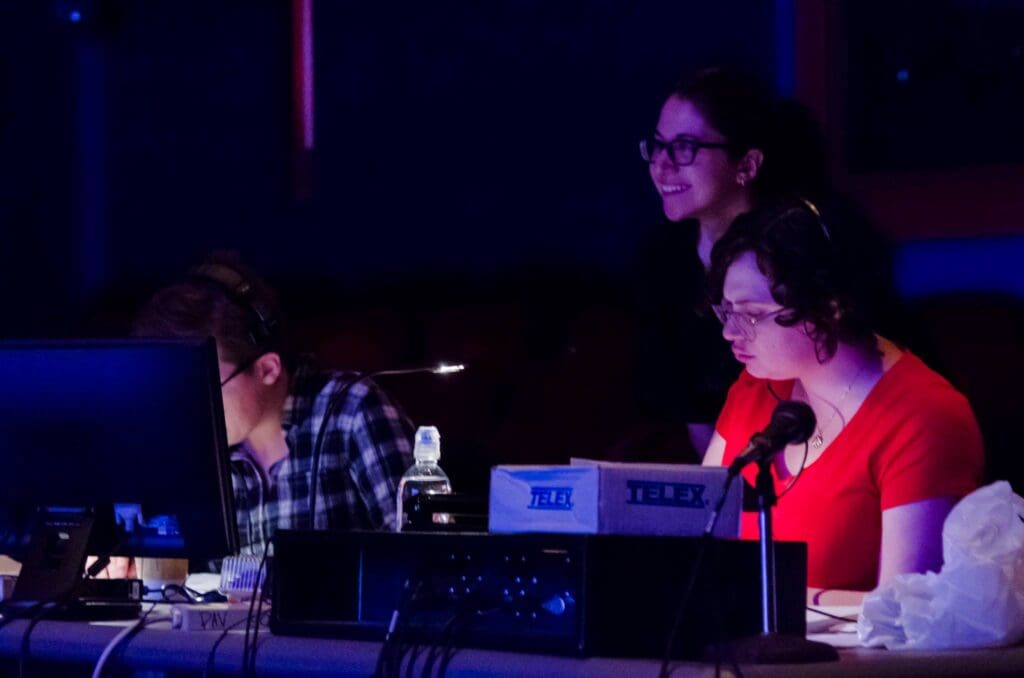
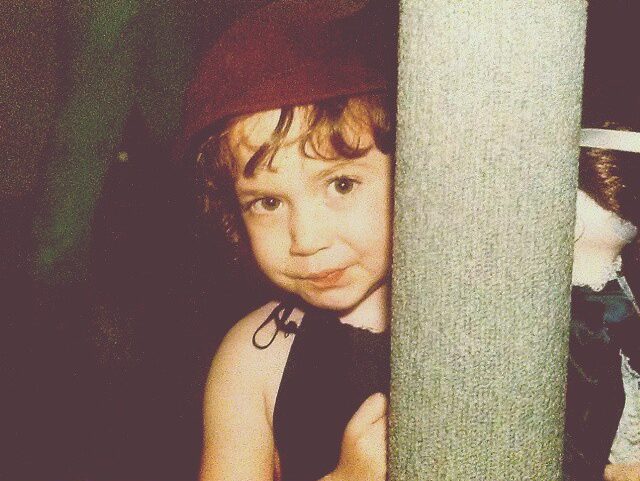
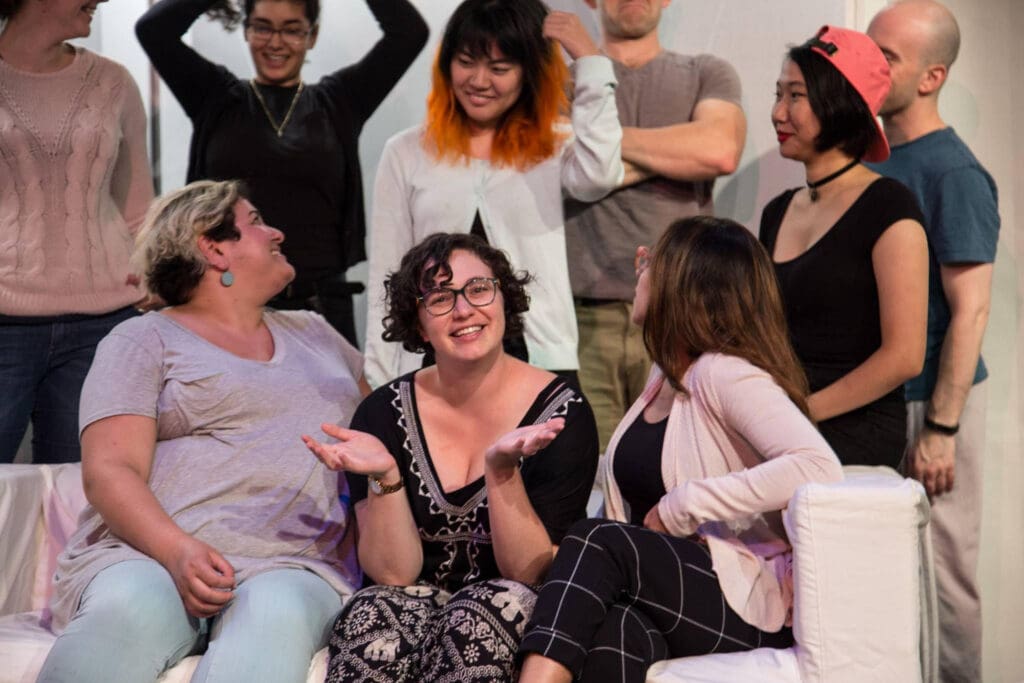
Comments are closed